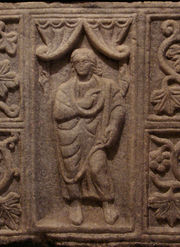Hérault
Hérault (French pronunciation: [eʁo]; Occitan: Erau) is a department in the south of France named after the Hérault river.
Contents |
History
Hérault is one of the original 83 departments created during the French Revolution on 4 March 1790. It was created from part of the former province of Languedoc.
At the beginning of the 20th century, the wine-growing region was devastated, and thousands of workers revolted. This revolt was suppressed very harshly by the government of Georges Clemenceau.
The catastrophic frost of the winter of 1956 damaged the olive trees, and the olive-growing regions did not recover until 1980. Many of the olive-industry co-ops closed.
Geography
Hérault is part of the current region of Languedoc-Roussillon and is surrounded by the departments of Aude, Tarn, Aveyron, Gard, and the Mediterranean (Gulf of Lion) on the south.
The department is very geographically diverse, with beaches in the south, the Cévennes mountains in the north, and agricultural land in between.
The important rivers are:
- Orb
- Hérault
- Vidourle
The area of Hérault near the town of Lodève is an antipode point with Chatham Island, off the east coast of New Zealand.
Climate

The average daytime temperature is around 25-30 degrees Celsius in July and August and 8-10 degrees Celsius in December and January.
Politics
The President of the General Council is André Vezinhet of the Socialist Party.
| Party | seats | |
|---|---|---|
| • | Socialist Party | 31 |
| • | Miscellaneous Left | 6 |
| Union for a Popular Movement | 5 | |
| • | French Communist Party | 3 |
| Miscellaneous Right | 3 | |
| • | Hunting, Fishing, Nature, Tradition | 1 |
Demographics
The inhabitants of the department are called Héraultais.
Culture
Montpellier hosts the following festivals:
- Saperlipopette, voilà Enfantillages !
- Printemps des Comédiens
- Festival du Cinéma Méditerranéen
- Comédie du Livre
- Festival Radio-France Montpellier
- Festival Montpellier Danse
The Canal du Midi has been designated as a World Heritage Site by UNESCO.
Tourism
The Mediterranean beaches are a major attraction, as well as the caves of Clamouse and Demoiselles.
Part of Cap d'Agde is a major nudist resort.
Cruising along the Canal du Midi and walking or cycling along the tow paths is a popular holiday option.
See also
- Cantons of the Hérault department
- Communes of the Hérault department
- Arrondissements of the Hérault department
- Castles in Hérault
External links
- (French) Prefecture website
- (French) Conseil Général website
- (English) The Hérault Tourist Board
- (English) Canal du Midi
- (English) Official tourist office website for Béziers
- "A Force in Gaul", in On Something by Hilaire Belloc (1910).
|
|||||